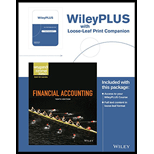
Concept explainers
Accounts receivable:
Accounts receivable refers to the amounts to be received within a short period of 30-60 days of time, from the customers, upon the sale of goods and services on account. In other words, accounts receivable are amounts customers owe to the business. Accounts receivable is an asset of a business.
Note receivable:
Note receivable refers to a written promise by the debtor for the amounts to be received within a stipulated period of 60-90 days or longer time. This written promise is issued by a debtor or, a borrower to the lender or, creditor. Notes receivable is an asset of a business.
Other receivables:
Other receivables are the receivables other than the accounts receivable, and the notes receivable. These are the non-trade receivables. They do not usually result from the operation of the business. Interest receivable, advances to employees, and income tax refundable are some of the examples of other receivables.
To prepare: The
Want to see the full answer?
Check out a sample textbook solution
Chapter 8 Solutions
Financial Accounting, 10e WileyPLUS Registration Card + Loose-leaf Print Companion
- Daniel acquires a 30% interest in the PPZ Partnership from Paolo, an existing partner for $39,000 of cash. The PPZ Partnership includes $10,000 of recourse liabilities. What is Daniel's basis in his partnership interest?arrow_forwardWhat is the gross profit for the period?arrow_forwardMCQarrow_forward
- Please provide the solution to this financial accounting question using proper accounting principles.arrow_forwardPlease provide the accurate answer to this financial accounting problem using appropriate methods.arrow_forwardPlease provide the correct solution to this financial accounting question using valid principles.arrow_forward
- I need help with this general accounting question using standard accounting techniques.arrow_forwardPlease see an attachment for details for general accounting question not use aiarrow_forwardWhen should accountants modify allocation sequences? a. Order never affects results b. Standard sequences fit all cases c. Modifications create confusion d. Complex resource flows demand specialized orderingarrow_forward

 AccountingAccountingISBN:9781337272094Author:WARREN, Carl S., Reeve, James M., Duchac, Jonathan E.Publisher:Cengage Learning,
AccountingAccountingISBN:9781337272094Author:WARREN, Carl S., Reeve, James M., Duchac, Jonathan E.Publisher:Cengage Learning, Accounting Information SystemsAccountingISBN:9781337619202Author:Hall, James A.Publisher:Cengage Learning,
Accounting Information SystemsAccountingISBN:9781337619202Author:Hall, James A.Publisher:Cengage Learning, Horngren's Cost Accounting: A Managerial Emphasis...AccountingISBN:9780134475585Author:Srikant M. Datar, Madhav V. RajanPublisher:PEARSON
Horngren's Cost Accounting: A Managerial Emphasis...AccountingISBN:9780134475585Author:Srikant M. Datar, Madhav V. RajanPublisher:PEARSON Intermediate AccountingAccountingISBN:9781259722660Author:J. David Spiceland, Mark W. Nelson, Wayne M ThomasPublisher:McGraw-Hill Education
Intermediate AccountingAccountingISBN:9781259722660Author:J. David Spiceland, Mark W. Nelson, Wayne M ThomasPublisher:McGraw-Hill Education Financial and Managerial AccountingAccountingISBN:9781259726705Author:John J Wild, Ken W. Shaw, Barbara Chiappetta Fundamental Accounting PrinciplesPublisher:McGraw-Hill Education
Financial and Managerial AccountingAccountingISBN:9781259726705Author:John J Wild, Ken W. Shaw, Barbara Chiappetta Fundamental Accounting PrinciplesPublisher:McGraw-Hill Education





